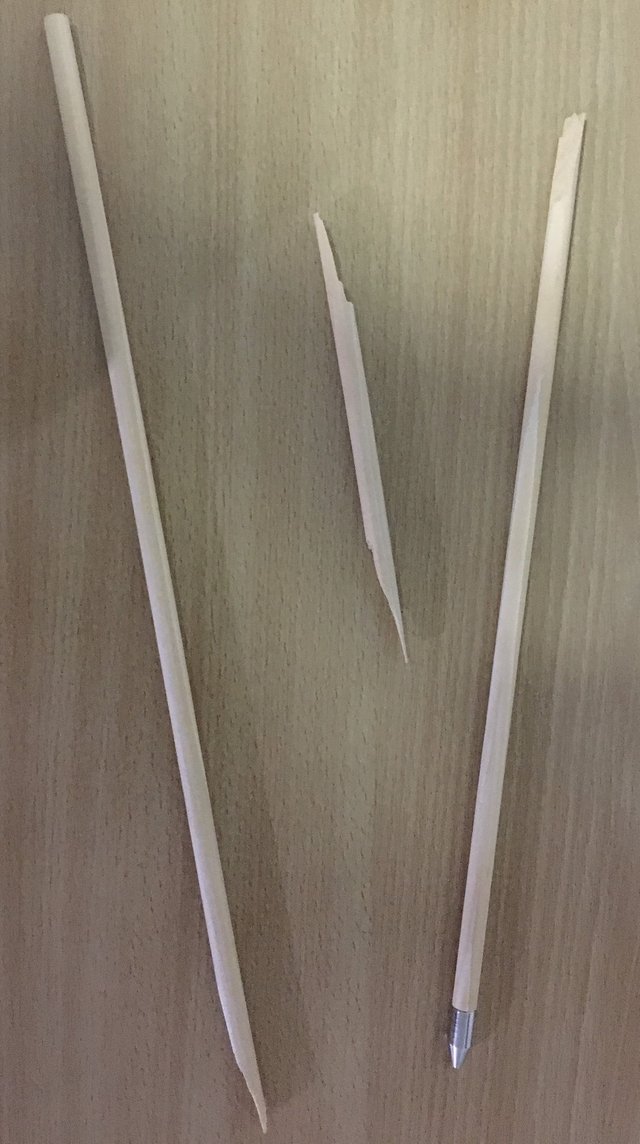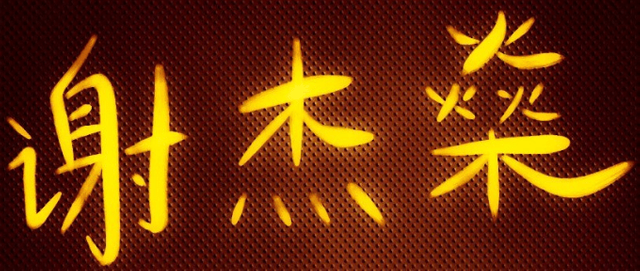To Break an Arrow with a Bared Throat

"This is a forty-pound arrow," the trainer said. "It will stop a grizzly bear."
As he spoke, he held up the arrow. The wooden shaft was as long as a man's arm, terminating in an iron point that gleamed dully in the light.
"You will break this arrow with your throat."
A palpable silence fell across the crowd.
Then came the gasps. The tittering. The whispers and muttering. To my side, my wife stared at me in wide-eyed fear. My heart quivered.
But only a moment.
This can be done, I thought.
The Preparation
This was a dangerous exercise, no question about it. The trainer and his assistant delivered a long safety brief, emphasizing proper posture and procedures. He described the many ways the exercise could go wrong: debris flying all over the room, improperly held arrows flipping away, previous participants being sent to hospital after failing to comply fully with safety procedures.
And still there was a sense of unreality about the exercise. Previously the trainers had made us go through a long show of preparing for another high-intensity activity, only to call it off at the last second. Maybe it would be the same this time.
I breathed, and banished the thought.
Maybe it would be canceled. But I would comport myself as if they would follow through.
I was here. I was committed.
But fear is contagious. My wife gripped my hand in fright. The other participants stared at the trainer, drinking in his words. He tried to lighten the situation, but he didn't shy away from the possibility of injury. An improperly held arrow might twist away and puncture the neck ligament, causing a great deal of pain and four months' recovery time. Or it could penetrate the submandibular triangle, the soft spot behind the chin, causing massive bleeding. The arrow had to be perfectly positioned at the base of the throat, held horizontally to the ground, point firmly dug into the suprasternal notch, or else. He didn't have to say it, but the specter of a quick and messy death hovered over the crowd.
Then I got a grip and thought carefully about the situation.
There was an element of risk, yes. But if the activity were inherently high-risk, there was no way the organization would carry it out. Even if they had us sign indemnity forms, nobody wanted the negative publicity from deaths and hospitalizations. The news would blast the organization's reputation to shreds. There were plenty of crew around the room to ensure everyone's safety, and a medical team on standby.
Besides, Shaolin monks broke spears with their throats all the time.
"Are you going to do this?" my wife asked.
For all that, the fear remained. But I would not be conquered by it.
"I am here. I'm committed," I replied.
Clear Vision
The audience divided themselves into ten-person groups for the exercise. My wife needed emotional support for this, so I led her to the nearest group. We sat in a circle, and waited.
More instructions. More safety tips. Reiterations of important points.
And, at last, we received our arrows.
I took mine with both hands, keeping the point and the nock safely pointed away from people. Seated cross-legged on the floor, I set it down before me and studied it from end to end.
And smiled.
The arrowhead was blunt.
There was no point. Just a rounded iron cap.
The wood was light, almost feathery, in my hands. With a slight sideways pressure, it would buckle and break. And there was no fletching.
This was no grizzly-killing arrow.
It barely qualified as a weapon.
"Is it dangerous?" my wife asked.
"It's blunt," I said, pointing at the tip.
And still, she was scared. The most visibly afraid among everyone in the group, her attention captured entirely by her arrow.
I leaned into her ear.
"If a person is threatened by a forest of knives and swords and spears, if he hears the name of Guanyin, the knives and swords and spears shall shatter in an instant. Be not afraid."
And squeezed her hand.
Much later, I would realize I misquoted Chapter 25 of the Lotus Sutra. The actual sentence was:
"Further, if a person who is about to be harmed calls out the name of Guanshiyin Bodhisattva, the knives and staves of the attackers will break into pieces and he will be saved."
Even so, the intent is the same: a litany against harm.
The sutra does not grant the reciter supernatural powers. Calling on the name of Guanyin will not literally break weapons into pieces. If it were that powerful, there would never be a need for body armor.
The true purpose is the subjugation of fear. Through single-minded focus on the Bodhisattva, all fear of weapons will be extinguished. There is simply no space left in the mind for fear to take root and grow, freeing the mind completely.
And in an exercise like this, fear is the killer of the body and spirit.
One last round of safety briefs. One last check. And it was time to break.
The Breaking
I went first.
My wife was still afraid. She needed to follow the lead of someone she could trust. I stepped up and readied myself.
My partner, a tall Indian man, held out his right hand and braced his left hand against his elbow. With his palm, he dug the arrow into my throat. The iron pressed into the soft tissue, digging deep. My pulse thudded against the arrowhead.
But it was not time to go.
The holder wasn't in the right position. His arm was bent. It had to be locked. We delayed the exercise, coaching him to adopt the right stance. I stepped back, giving him room to lock his arm, but he stepped in with me, keeping his arm bent. Still holding the arrow against my throat, we talked him through, until at last his arm was straightened and his feet correctly positioned.
Now came the decision point.
I breathed.
Moved.
And immediately the arrow pushed back into me. It dug into my skin, into my flesh. A dull pain radiated through nerve and soft tissue. Flesh stretched, stretched, and stretched again. A little part of my mind jibbered that at any moment the arrow would penetrate. And still I pushed.
And then I realized I was doing it wrong.
I was leaning into the arrow, pushing against it with my throat. This was the wrong thing to do. I was simply building a bridge between me and the holder through the arrow, locking us all in place through tension. All I was doing was driving the arrow deeper into me.
I breathed.
Lifted my rear foot off the floor and swung it forward.
Unbalanced, I fell into the void.
The shaft flexed. Buckled.
Broke.
And the crowd went wild. Exploding into cheers and applause, they celebrated the occasion. My partner readied himself for a hug.
I nodded at them. Gathered the broken arrow. And made room for the next.
The Conquest
The trainer explicitly ordered us to celebrate the breaking. To lock it into our minds. I understand the psychology behind it. I'm sure most people felt a sense of triumph as their arrows broke. I wish I could say the same.
But in truth, I felt nothing but light wood failing under pressure.
I imagine that, as conceived, the participant conquers his fears at the moment of breaking. But I defeated fear before the exercise even began. By the time I stepped up, all that mattered to me was physics and body mechanics.
And a single step.
Was it worth celebrating? I don't know. Do you celebrate emptiness? Is there victory in breaking a blunt non-weapon?
But I imagine I don't fit the profile of the average seminar participant.
With hypersensitive senses, physical contact is extremely unpleasant to me. I am not swayed by displays of high energy and exuberant emotions, and it hurts to hear loud cheering and applause. Throughout the seminar, I had to wear earplugs just to stay sane. Huge celebrations don't appeal to me -- if anything, the pain overrides any pleasure that I might experience.
In exercises designed to bring out emotions and unearth stuck feelings, I saw simply an opportunity to practice release and detachment. There was no fear and no anger, neither sorrow nor tension, no manufactured joy and no forced celebration. Simply equanimity.
But if there was something worth celebrating, it was this:
My wife was among the last to go. When it was her turn, her partner took ten seconds to set the arrow against her throat. She held in place for a moment.
And stepped.
And broke the arrow.
Among us, she was the most afraid of the arrow. But at the decision point, she was the fastest to break it.
In the build-up to the breaking, there was only fear. But in the moment, there was only action.

For (hopefully) fictitious stories of men conquering fear in a monster-infested dungeon, check out my latest novel DUNGEON SAMURAI VOL. 2: KAMI NO KISHI!
To stay updated on my latest writing news and promotions, sign up for my mailing list here!
To listen to the audio version of this article click on the play image.

Brought to you by @tts. If you find it useful please consider upvoting this reply.